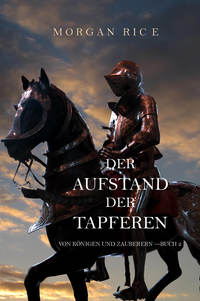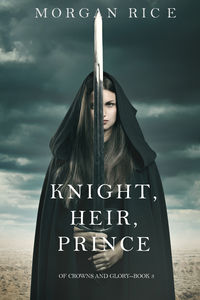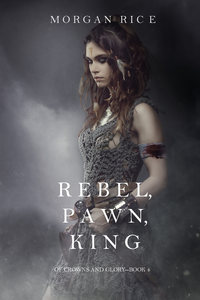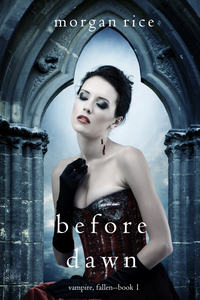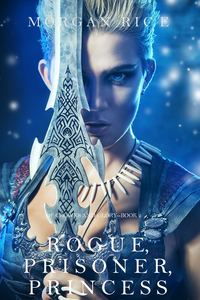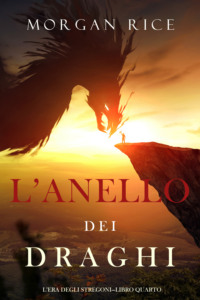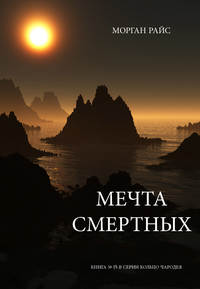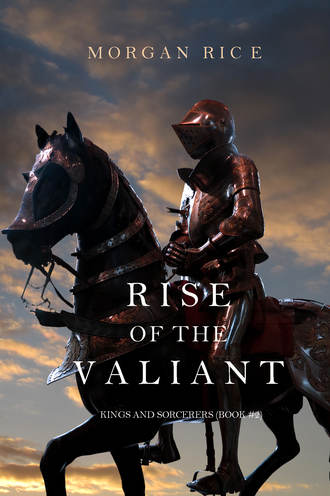
Полная версия
Rise of the Valiant
The Pandesians would never expect an attack, since word of Duncan’s revolt could not have spread this far south so soon – not if Duncan reached them in time. And they would certainly never expect an attack at nighttime, much less in the snow. They would know the risks of riding at night, of horses breaking legs, and of a myriad other problems. Wars, Duncan knew, were often won more by surprise and speed than by force.
Duncan planned to ride all night long until they reached Esephus, to try to conquer the vast Pandesian force and take back this great city with his few hundred men. And if they took Esephus, then maybe, just maybe, he could gain momentum and begin the war to take back all of Escalon.
“Down below!” Anvin called out, pointing into the snow.
Duncan looked down at the valley below and spotted, amidst the snow and fog, several small villages dotting the countryside. Those villages, Duncan knew, were inhabited by brave warriors, loyal to Escalon. Each would have but a handful of men, but it could add up. He could gain momentum and bolster his army’s ranks.
Duncan shouted above the wind and horses to be heard.
“Sound the horns!”
His men sounded a series of short horn blasts, the old rallying cry of Escalon, a sound which warmed his heart, a sound which had not been heard in Escalon in years. It was a sound that would be familiar to his fellow countrymen, a sound that would tell them all that they needed to know. If there were any good men in those villages, that sound would stir them.
The horns sounded again and again, and as they neared, slowly torches lit in the villages. Villagers, alerted to their presence, began to fill the streets, their torches flickering against the snow, men hastily getting dressed, grabbing weapons and donning whatever crude armor they had. They all gazed up the hill to see Duncan and his men approaching, gesturing as if filled with wonder. Duncan could only imagine what a sight his men made, galloping in the thick of night, in a snowstorm, down the hill, raising hundreds of torches like a legion of fire fighting the snow.
Duncan and his men rode into the first village and came to a stop, their hundreds of torches lighting the startled faces. Duncan looked down at the hopeful faces of his countrymen, and he put on his fiercest battle face, preparing himself to inspire his fellow men as never before.
“Men of Escalon!” he boomed, slowing his horse to a walk, turning and circling as he tried to address them all as they pressed close around him.
“We have suffered under the oppression of Pandesia for far too long! You can choose to stay here and live your lives in this village and remember the Escalon that once was. Or you can choose to rise up as free men, and help us begin the great war for freedom!”
There arose a cheer of joy from the villagers as they unanimously rushed forward.
“The Pandesians are taking our girls now!” called out one man. “If this is freedom, then I don’t know what liberty is!”
The villagers cheered.
“We are with you, Duncan!” shouted another. “We shall ride with you to our deaths!”
There arose another cheer, and the villagers rushed to mount their horses and join his men. Duncan, satisfied at his growing ranks, kicked his horse and continued to ride out from the village, starting to realize how long overdue Escalon was to revolt.
Soon they reached another village, its men already out and waiting, their torches lit, as they heard the horns, the shouts, saw the army growing and clearly knew what was happening. Local villagers called out to each other, recognizing each other’s faces, realized what was happening, and needed no more speeches. Duncan swept through this village as he did the last, and it took no convincing for the villagers, too eager for freedom, too eager to have their dignity restored, to mount their horses, grab their weapons, and join Duncan’s ranks, wherever he should take them.
Duncan charged through village after village, covering the countryside, all lighting up in the night, despite the wind, despite the snow, despite the black of night. Their desire for freedom was too strong, Duncan realized, to do anything but shine even in the darkest night – and to take up arms to win back their lives.
* * *Duncan rode all through the night, leading his growing army south, his hands raw and numb from the cold as he gripped the reins. The further south they went, the more the terrain began to morph, the dry cold of Volis replaced with the wet cold of Esephus, its air heavy, as Duncan remembered it to be, with the damp of the sea and the smell of salt. The trees were shorter here, too, windswept, all seemingly bent from the easterly gale that never ceased.
They crested hill after hill. The clouds parted, despite the snow, and the moon opened up in the sky, shining down on them, lighting their way enough to see by. They rode, warriors against the night, and it was a night Duncan would remember, he knew, for the rest of his life. Assuming he survived. This would be the battle upon which hinged everything. He thought of Kyra, his family, his home, and he did not want to lose them. His life was on the line, and the lives of all he knew and loved, and he would risk it all tonight.
Duncan glanced back over his shoulder and was elated to see he had picked up several hundred more men, all riding together as one, with a single purpose. He knew that, even with their numbers, they would be vastly outnumbered and would be facing a professional army. Thousands of Pandesians were stationed in Esephus. Duncan knew that Seavig still had hundreds of his own disbanded men at his disposal, of course, but there was no knowing if he would risk it all to join Duncan. Duncan had to assume he would not.
They soon crested yet another hill and as they did, they all came to a stop, needing no prodding. For there, far below, sprawled the Sea of Tears, its waves crashing to shore, the great harbor, and the ancient city of Espehus rising up beside it. The city looked as if it had been built into the sea, the waves crashing against its stone walls. The city was built with its back to land, as if facing the sea, its gates and portcullises sinking into the water as if they cared more about accommodating ships than horses.
Duncan studied the harbor, the endless ships packed in it, all, he was chagrined to see, flying the banners of Pandesia, the yellow and blue that flew like an offense to his heart. Flapping in the wind was the emblem of Pandesia – a skull in the mouth of an eagle – making Duncan sick. Seeing such a great city held captive by Pandesia was a source of shame for Duncan, and even in the black night his cheeks blushed red. The ships sat there smugly, anchored safely, none expecting an attack. Of course. Who would dare attack them? Especially in the black of night, and in a snowstorm?
Duncan felt all his men’s eyes on him, and he knew his moment of truth had come. They all awaited his fateful command, the one that would change the fate of Escalon, and he sat there on his horse, wind howling, and he felt his destiny welling up within him. He knew this was one of those moments that would define his life – and the lives of all these men.
“FORWARD!” he boomed.
His men cheered, and as one they all charged down the hillside, racing for the harbor, several hundred yards away. They raised their torches high, and Duncan felt his heart slamming in his chest as the wind brushed his face. He knew this mission was suicide – yet he also knew it was crazy enough that it just might work.
They tore down the countryside, their horses galloping so fast that the cold air nearly took his breath away, and as they neared the harbor, its stone walls hardly a hundred yards before them, Duncan prepared for battle.
“ARCHERS!” he called out.
His archers, riding in neat rows behind him, set their arrows aflame, torching their tips, awaiting his command. They rode and rode, their horses thundering, the Pandesians below still not aware of the attack to come.
Duncan waited until they got closer – forty yards out, then thirty, then twenty – and finally he knew the time was right.
“FIRE!”
The black night was suddenly lit up with thousands of flaming arrows, sailing in high arcs through the air, cutting through the snow, making their way for the dozens of Pandesian ships anchored in the harbor. One by one, like fireflies, they found their targets, landing on the long, flapping canvas of Pandesian sails.
It took but moments for the ships to be lit up, the sails and then the ships all aflame, as the fire spread rapidly in the windy harbor.
“AGAIN!” Duncan yelled.
Volley followed volley, as fire-tipped arrows fell like raindrops all over the Pandesian fleet.
The fleet was, at first, quiet in the dead of night, the soldiers all fast asleep, all so unsuspecting. The Pandesians had become, Duncan realized, too arrogant, too complacent, never possibly suspecting an attack like this.
Duncan did not give them time to rally; emboldened, he galloped forward, closing in on the harbor. He led the way right up to the stone wall bordering the harbor.
“TORCHES!” he cried.
His men charged right up to the shoreline, raised their torches high, and with a great shout, they followed Duncan’s example and hurled their torches onto the ships closest to them. Their heavy torches landed like clubs on the deck, the thumping of wood filling the air, as dozens more ships were set aflame.
The few Pandesian soldiers on duty noticed too late what was happening, finding themselves caught in a wave of flame, and shrieking and jumping overboard.
Duncan knew it was only a matter of time until the rest of the Pandesians woke.
“HORNS!” he shouted.
Horns were sounded up and down the ranks, the old rallying cry of Escalon, the short bursts that he knew Seavig would recognize. He hoped it would rouse him.
Duncan dismounted, drew his sword, and rushed for the harbor wall. Without hesitating, he jumped over the low stone wall and onto the flaming ship, leading the way as he charged forward. He had to finish the Pandesians off before they could rally.
Anvin and Arthfael charged at his side and his men joined in, all letting out a great battle cry as they threw their lives to the wind. After so many years of submission, their day of vengeance had come.
The Pandesians, finally, were roused. Soldiers began to emerge from the decks below, streaming forth like ants, coughing against the smoke, dazed and confused. They caught sight of Duncan and his men, and they drew swords and charged. Duncan found himself being confronted by streams of men – yet he did not flinch; on the contrary, he attacked.
Duncan charged forward and ducked as the first man slashed for his head, then came up and stabbed the man in the gut. A soldier slashed at his back, and Duncan spun and blocked it – then spun the soldier’s sword around and stabbed him in the chest.
Duncan fought back heroically as he was attacked from all sides, recalling days of old as he found himself immersed in battle, parrying on all sides. When men got too close to reach with his sword, he leaned back and kicked them, creating space for himself to swing; in other instances, he spun and elbowed, fighting hand to hand in the close quarters when he needed to. Men dropped all around him, and none could get close.
Duncan soon found himself joined by Anvin and Arthfael as dozens of his men rushed forward to help. As Anvin joined him, he blocked the blow of a solider charging Duncan from behind, sparing him a wound – while Arthfael stepped forward, raised his sword, and blocked a hatchet coming down for Duncan’s face. As he did, Duncan simultaneously stepped forward and stabbed the solider in the gut, he and Arthfael working together to fell him.
They all fought as one, a well-oiled machine from all their years together, all guarding each other’s backs as the clang of swords and armor pierced the night.
All around him, Duncan saw his men boarding ships up and down the harbor, attacking the fleet as one. Pandesian soldiers streamed forth, all fully roused, some of them on fire, and the warriors of Escalon all fought bravely amidst the flames, none backing down even as fires raged all around them. Duncan himself fought until he could lift his arms no more, sweating, smoke stinging his eyes, swords clanging all around him, dropping one soldier after the next that tried to escape to shore.
Finally, the fires grew too hot; Pandesian soldiers, in full armor, trapped by the flames, leapt from their ships into the waters below – and Duncan led his men off the ship and over the stone wall, back to the harbor side. Duncan heard a shout and he turned and noticed hundreds of Pandesian soldiers trying to follow, to pursue them off the ship.
As he stepped down onto dry land, the last of his men to leave, he turned, raised his sword high, and hacked at the great ropes binding the ships to shore.
“THE ROPES!” Duncan yelled.
Up and down the harbor his men followed his lead and severed the ropes anchoring the fleet to shore. As the great rope before him finally snapped, Duncan placed his boot on the deck and with a great kick, shoved the ship away from shore. He groaned from the effort, and Anvin, Arthfael and dozens of others rushed forward, joining him. As one, they all shoved the burning hull away from shore.
The flaming ship, filled with shrieking soldiers, drifted inevitably toward the other ships in the harbor – and as it reached them, it set them aflame, too. Men leapt from ships by the hundreds, shrieking, sinking into the black waters.
Duncan stood there, breathing hard and watching, his eyes aglow, as the whole harbor soon lit in a great conflagration. Thousands of Pandesians, fully roused now, emerged from the lower decks of other ships – but it was too late. They surfaced to a wall of flame, and left with the choice of being burned alive or jumping into a death by drowning in the freezing waters, they all chose the latter. Duncan watched as the harbor soon filled with hundreds of bodies, bobbing in the waters, crying out as they tried to swim for shore.
“ARCHERS!” Duncan yelled.
His archers took aim and fired volley after volley, aiming for the flailing soldiers. One by one they found their marks, and the Pandesians sank.
The waters became slick with blood, and soon there came snapping noises and the sound of shrieking, as the waters were filled with glowing yellow sharks, feasting in the blood-filled harbor.
Duncan looked out and it slowly dawned on him what he had done: the entire Pandesian fleet, but hours ago sitting so defiantly in the harbor, a sign of Pandesian conquest, was no more. Its hundreds of ships were destroyed, all burning together in Duncan’s victory. His speed and surprise had worked.
There came a great shout amongst his men, and Duncan turned to see all of his men cheering as they watched the ships burn, their faces black with soot, exhaustion from having ridden through the night – yet all of them drunk with victory. It was a cry of relief. A cry of freedom. A cry they had been waiting years to release.
Yet no sooner had it sounded when another shout filled the air – this one much more ominous – followed by a sound which made the hair rise on Duncan’s neck. He turned and his heart dropped to see the great gates to the stone barracks slowly opening. As they did, there appeared a frightening sight: thousands of Pandesian soldiers, fully armed, in perfect ranks; a professional army, outnumbering his men ten to one, was preparing. And as the gates opened, they let out a cry and charged right for them.
The beast had been roused. Now, the real war would begin.
Chapter Six
Kyra, clutching Andor’s mane, galloped through the night, Deidre beside her, Leo at her feet, all racing through the snow-filled plains west of Argos like thieves fleeing through the night. As she rode, hour passing hour, the sound of the horses thumping in her ears, Kyra became lost in her own world. She imagined what might lie ahead of her in the Tower of Ur, who her uncle might be, what he would say about her, about her mother, and she could barely contain her excitement. Yet she also had to admit, she felt fear. It would be a long trek to cross Escalon, one she had never done before. And looming ahead of them, she saw, was the Wood of Thorns. The open plains were coming to an end, and they would soon be immersed in a claustrophobic wood filled with savage beasts. She knew all rules were off once they crossed that tree line.
The snow whipped her face as the wind howled across the open plains, and Kyra, her hands numb, dropped the torch from her hand, realizing it had burned dead long ago. She rode through the dark, lost in her own thoughts, the only sound that of the horses, of the snow beneath them, and of Andor’s occasional snarl. She could feel his rage, his untamed nature, unlike any beast she had ever ridden. It was as if Andor was not only unafraid of what lay ahead – but openly hoping for a confrontation.
Wrapped in her furs, Kyra felt another wave of hunger pains, and as she heard Leo whine yet again, she knew they could not all ignore their hunger much longer. They had been riding for hours and had already devoured their frozen strips of meat; she realized, too late, that they had not brought enough provisions. No small game surfaced on this snowy night, and it did not bode well. They would have to stop and find food soon.
They slowed as they neared the edge of the Wood, Leo snarling at the dark tree line. Kyra glanced back over her shoulder, at the rolling plains leading back to Argos, at the last open sky she would see for a while. She turned back and stared at the wood, and a part of her was loath to move ahead. She knew the reputation of the Wood of Thorns, and this, she knew, was a moment of no turning back.
“You ready?” she asked Dierdre.
Dierdre appeared to be a different girl now than the one who had left prison. She was stronger, more resolute, as if she had been to the depths of hell and back and was ready to face anything.
“The worst that can happen has already happened to me,” Deidre said, her voice cold and hard as the wood before them, a voice too old for her age.
Kyra nodded, understanding – and together, they set off, entering the tree line.
The moment they did, Kyra immediately felt a chill, even in this cold night. It was darker here, more claustrophobic, filled with ancient black trees with gnarled branches resembling thorns, and thick, black leaves. The wood exuded not a sense of peace, but one of evil.
They proceeded at a quick walk, as fast as they could amidst these trees, snow and ice crunching beneath their beasts. There slowly arose the sounds of odd creatures, hidden in the branches. She turned and scanned them searching for the source, but could find none. She felt they were being watched.
They proceeded deeper and deeper into the wood, Kyra trying to head west and north, as her father had told her, until she found the sea. As they went, Leo and Andor snarled at hidden creatures Kyra could not see, while she dodged the branches scratching her. Kyra pondered the long road ahead of her. She was excited at the idea of her quest, yet she longed to be with her people, to be fighting at their side in the war she had started. She already felt an urgency to return.
As hour followed hour, Kyra peered into the wood, wondering how much further until they reached the sea. She knew it was risky to ride in such darkness – yet she knew it was also risky to camp out here alone – especially as she heard another startling noise.
“Where is the sea?” Kyra finally asked Dierdre, mainly to break the silence.
She could tell from Dierdre’s expression that she had stirred her from her thoughts; she could only imagine what nightmares she was lost in.
Dierdre shook her head.
“I wish I knew,” she replied, her voice parched.
Kyra was confused.
“Didn’t you come this way when they took you?” she asked.
Dierdre shrugged.
“I was locked in a cage in the back of the wagon,” she replied, “and unconscious most of the trip. They could have taken me any direction. I don’t know this wood.”
She sighed, peering out into the blackness.
“But as we near Whitewood, I should recognize more.”
They continued on, falling into a comfortable silence, and Kyra could not help but wonder about Deidre and her past. She could feel her strength, yet also her profound sadness. Kyra found herself getting consumed by dark thoughts of the journey ahead, of their lack of food, of the biting cold and the savage creatures awaiting them, and she turned to Dierdre, wanting to distract herself.
“Tell me of the Tower of Ur,” Kyra said. “What’s it like?”
Dierdre looked back, black circles beneath her eyes, and shrugged.
“I’ve never been to the tower,” Dierdre replied. “I am from the city of Ur – and that is a good day’s ride south.”
“Then tell me of your city,” Kyra said, wanting to think of anything but here.
Dierdre’s eyes lit up.
“Ur is a beautiful place,” she said, longing in her voice. “The city by the sea.”
“We have a city south of us that is near the sea,” Kyra said. “Esephus. It is a day’s ride from Volis. I used to go there, with my father, when I was young.”
Dierdre shook her head.
“That is not a sea,” she replied.
Kyra was confused.
“What do you mean?”
“That is the Sea of Tears,” Dierdre replied. “Ur is on the Sea of Sorrow. Our is a much more expansive sea. On your eastern shore, there are small tides; on our western coast, the Sorrow has waves twenty feet high that crash into our shores, and a tide that can pull out ships in a glance, much less men, when the moon is high. Ours is the only city in all of Escalon where the cliffs lower enough to allow ships to touch to shore. Our has the only beach in all of Escalon. It is why Andros was built but a day’s ride east of us.”
Kyra pondered her words, glad to be distracted. She recalled all of this from some lesson in her youth, but she had never pondered it all in detail.
“And your people?” Kyra asked. “What are they like?”
Dierdre sighed.
“A proud people,” she replied, “like any other in Escalon. But different, too. They say those of Ur have one eye on Escalon and one on the sea. We look to the horizon. We are less provincial than the others – perhaps because so many foreigners touch down on our shores. The men of Ur were once famed warriors, my father foremost amongst them. Now, we are subjects, like everyone else.”
She sighed, and fell silent for a long time. Kyra was surprised when she started to speak again.
“Our city is cut with canals,” Dierdre continued. “When I was growing up, I would sit atop the ridge and watch the ships come in and out for hours, sometimes days. They would come to us from all over the world, flying all different banners and sails and colors. They would bring in spices and silks and weapons and delicacies of every manner – sometimes even animals. I would look at the people coming and going, and I would wonder about their lives. I wanted desperately to be one of them.”
She smiled, an unusual sight, her eyes aglow, clearly remembering.
“I used to have a dream,” Dierdre said. “When I came of age, I would board one of those ships and sail away to some foreign land. I would find my prince, and we would live on a great island, in a great castle somewhere. Anywhere but Escalon.”
Kyra looked over to see Dierdre smiling.
“And now?” Kyra asked.
Dierdre’s face fell as she looked down at the snow, her expression suddenly filled with sadness. She merely shook her head.
“It’s too late for me,” Dierdre said. “After what they’ve done to me.”
“It’s never too late,” Kyra said, wanting to reassure her.
But Dierdre merely shook her head.
“Those were the dreams of an innocent girl,” she said, her voice heavy with remorse. “That girl is long gone.”
Kyra felt sadness for her friend as they continued in silence, deeper and deeper into the wood. She wanted to take away her pain, but did not how. She wondered at the pain that some people lived with. What was it her father had told her once? Do not be fooled by men’s faces. We all lead lives of quiet despair. Some hide it better than others. Feel compassion for all, even if you see no outward reason.
“The worst day of my life,” Dierdre continued, “was when my father conceded to Pandesian law, when he let those ships enter our canals and let his men lower our banners. It was a sadder day, even, than when he allowed them to take me.”


